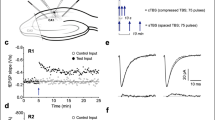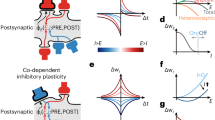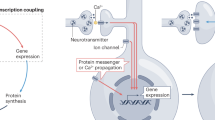Abstract
HIPPOCAMPAL synapses show an unusual degree of physiological plasticity. Relatively modest levels of repetitive stimulation cause considerable enhancement in subsequent responses to single pulse stimulation, and this potentiation lasts for hours and even days1–6. These findings, which have now been replicated in several laboratories, have aroused much interest, first because they seem to represent an excellent starting point for the analysis of synaptic plasticity in mammalian brain, and second, because their rapid development and persistence suggest that they may be related to processes involved in behavioural plasticity. The studies reported here represent an attempt to analyse the mechanisms underlying physiological plasticity in the hippocampus, in particular the locus and anatomical specificity of the effect. The change in magnitude of response which occurs after repetitive stimulation could reflect either presynaptic or postsynaptic adjustment. If the latter were the case, the change might involve a particular dendritic region innervated by the stimulated input, or alteration in the status of the entire postsynaptic neurone. Seeking data relevant to these questions, we have measured the effects of glutamic acid applied iontophoretically to different levels of the dendritic trees of the pyramidal cells before and after potentiation of the extracellular postsynaptic response.
This is a preview of subscription content, access via your institution
Access options
Subscribe to this journal
Receive 51 print issues and online access
$199.00 per year
only $3.90 per issue
Buy this article
- Purchase on Springer Link
- Instant access to full article PDF
Prices may be subject to local taxes which are calculated during checkout
Similar content being viewed by others
References
Lomo, T., Expl Brain Res., 12, 46–63 (1971).
Bliss, T. V. P., and Lomo, T., J. Physiol. Lond., 232, 331–356 (1973).
Bliss, T. V. P., and Gardner-Medwin, A. R., J. Physiol., Lond. 232, 357–374 (1973).
Douglas, R. M., and Goddard, G. V., Brain Res., 86, 205–215 (1974).
Schwartzkroin, P. A., and Wester, K., Brain Res., 89, 107–119 (1975).
Deadwyler, S. A., Gribkoff, V., Cotman, C. W., and Lynch, G., Brain Res. Bull., 1, 1–7 (1976).
Curtis, D. R., Phyllis, J. W., and Watkins, J. C., J. Physiol. Lond., 150, 656–682 (1960).
Krnjevic, K., and Phyllis, J. W., J. Physiol. Lond., 165, 274–327 (1963).
Krnjevic, K., Physiol. Rev., 54, 418–540 (1974).
Lynch, G., Smith, R. L., Browning, M. D., and Deadwyler, S., in Adv. Neurol., 12, (edit. by Kreutzberg, G.), 297–313 (Raven, New York, 1975).
Andersen, P., Bliss, T. V. P., and Skrede, K. K., Expl Brain Res., 13, 208–238 (1971).
Specner, H. J., Gribkoff, V. K., Cotman, C. W., and Lynch, G., Brain Res., 105, 471–481 (1976).
Thesleff, S., J. Physiol., Lond., 148, 659–664 (1959).
Author information
Authors and Affiliations
Rights and permissions
About this article
Cite this article
LYNCH, G., GRIBKOFF, V. & DEADWYLER, S. Long term potentiation is accompanied by a reduction in dendritic responsiveness to glutamic acid. Nature 263, 151–153 (1976). https://doi.org/10.1038/263151a0
Received:
Accepted:
Issue Date:
DOI: https://doi.org/10.1038/263151a0
This article is cited by
-
A synaptic model of memory: long-term potentiation in the hippocampus
Nature (1993)
-
Temporally distinct pre- and post-synaptic mechanisms maintain long-term potentiation
Nature (1989)
-
Cholinergic kindling: What has it taught us about epilepsy?
Journal of Neural Transmission (1985)
-
Synaptic plasticity at archicortical and neocortical levels
Neurophysiology (1985)
-
Action of acetylcholine on hippocampal responses during prolonged potentiation and depression following tetanization of the medial septum and dentate fascia
Neuroscience and Behavioral Physiology (1984)
Comments
By submitting a comment you agree to abide by our Terms and Community Guidelines. If you find something abusive or that does not comply with our terms or guidelines please flag it as inappropriate.



